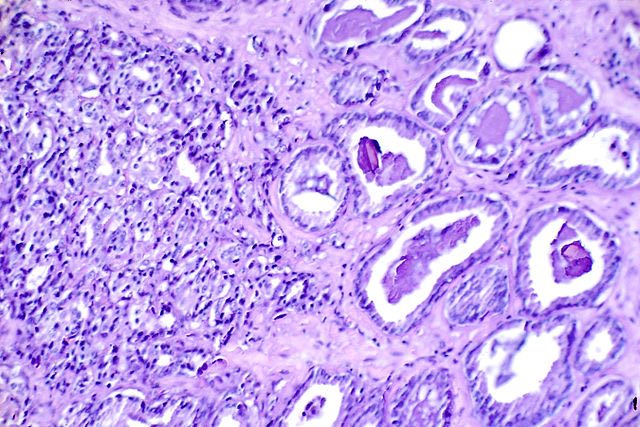 Prostate cancer cells by National Institutes of Health
Prostate cancer cells by National Institutes of Health
Men with advanced prostate cancer have been offered fresh hope thanks to a “promising” new drug combination.
It could significantly delay the progression of a deadly form of the disease in patients with specific genetic mutations, say scientists at University College London following a major international trial.
They tested the addition of niraparib, a type of targeted cancer drug known as a PARP inhibitor, to the standard hormone therapy treatment of abiraterone acetate and prednisone, known as AAP.
The study focused on patients diagnosed with advanced prostate cancer where cells have spread to other parts of the body, and who were starting their first treatment and also had alterations in genes involved in an essential type of DNA defect repair, known as homologous recombination repair (HRR).
Scientists explained that those genes help repair damaged DNA and when they are faulty, cancer cells can grow and spread more aggressively.
Around one in four people with advanced prostate cancer at this stage have alterations in HRR genes, such as BRCA1, BRCA2, CHEK2, and PALB2.
The standard treatment for advanced prostate cancer is currently the hormone-related AAP or similar drugs, but the mutations make the cancer more aggressive and, consequently, the disease progression with standard treatment is often far quicker—with shorter life expectancies.
The new trial involved 696 men across 32 countries with an average age of 68.
Half received the new combination therapy of niraparib plus APP, while the other half received standard treatment with a placebo. More than half of patients had alterations in their BRCA1 or BRCA2 genes in this double-blind trial, meaning neither patients nor doctors knew which treatment was being administered.
Risk of cancer growth slashed by 37-48%
The findings, published last month in the journal Nature Medicine, showed that, after an average follow-up period of 30.8 months, niraparib reduced the risk of cancer growth by 37% compared to AAP alone in all patients and by 48% in the subgroup of patients with BRCA1 or BRCA2 mutations.
The time until symptoms got worse was twice as long for patients who received niraparib compared to those who received a placebo, reducing the number of patients who had notable worsening in symptoms from 34% to 16%.
The research team observed a trend toward improved overall survival in the niraparib group, but they say a longer follow-up period is needed to confirm that niraparib improves life expectancy.
“Although current standard treatments are very effective for the majority of patients with advanced prostate cancer, a small but very significant proportion of patients have limited benefit,” said study leader Professor Gerhardt Attard, of the university’s Cancer Institute.
“We now know that prostate cancers with alterations in HRR genes account for a significant group of patients whose disease recurs quickly and has an aggressive course.
“By combining with niraparib we can delay the cancer returning and hopefully significantly prolonging life expectancy.”
HERE’S A TIP: Improving Physical Fitness with Cardio May Cut Prostate Cancer Risk by More Than a Third
“These findings are striking because they support widespread genomic testing at diagnosis with use of a targeted treatment for patients who stand to derive the greatest benefit.
While the treatment was generally well tolerated, Prof. Attard said side effects were more common in the niraparib group, such as an increase in cases of anemia and high blood pressure, with 25% of patients requiring blood transfusions.
MORE PROSTATE CANCER HOPE:
• New Way of Supercharging Prostate Cancer Treatment Weakens Tumors at Cellular Level
• New Way of Treating Aggressive Prostate Cancer Shows ‘Promise’ in Cedars-Sinai Phase III Clinical trial
The team said that while the results are “promising” further research is needed to confirm long-term survival benefits and to analyze the impact of newer imaging techniques and broader genetic testing.